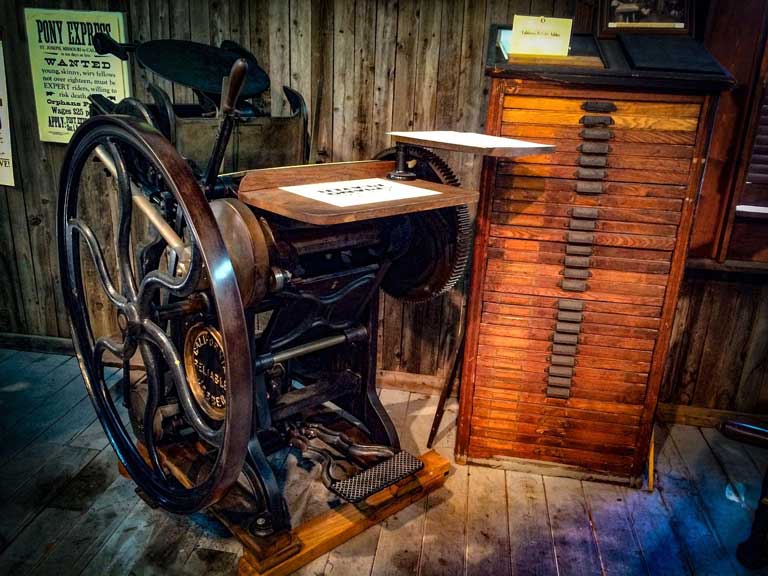Communications History: The Printing Press

The printing press transformed the way information was created, shared and preserved, playing a key role in shaping human history. With its origins in ancient China and its refinement in 15th-century Europe, the printing press revolutionized the spread of knowledge, making books, ideas and information more accessible to people across social classes.
Origins and early development of printing technology
Exactly when the first printing press was invented and by whom is not known, but the earliest known forms of printing are from China during the first millennium C.E. The Diamond Sutra, a Buddhist text made with woodblock printing during the Tang Dynasty in 868 C.E., is the oldest surviving printed book. The book was made by carving the text into wooden blocks in reverse, then applying ink to print onto a scroll. Other printed materials, such as calendars, dictionaries and educational guides have been found from this same period. Printing eventually spread to Japan and Korea, where printed books replaced scrolls.
The emergence of movable type
In the early 11th century, Chinese artisan Bi Sheng developed the first press that used movable type, allowing people to reposition and reuse characters on printed pages. The characters were carved into clay tiles that could be assembled in an iron frame. Bi’s technique was documented by Shen Kuo in his 1086 book Dream Pool Essays. This technology made it possible to print multiple copies of a book quickly and efficiently. By the 1120s, printed books had spread all over China. Owning large collections of books soon became a status symbol.
Wang Chen and the first mass-printed book
In 1297, Wang Chen, a magistrate in China, revived woodblock printing by making the wooden blocks more durable and placing them on a revolving table that gave typesetters faster access to the characters they needed. Wang’s Nung Shu, a 1313 treatise on agricultural practices, became the first mass-produced book in the world. It also provided written documentation of numerous Chinese inventions for which Europeans later claimed credit.
Gutenberg’s printing press
While printing had existed in China for centuries, inventor Johannes Gutenberg brought this idea to the West in 1450, creating a new type of press that used individual characters cast in metal. He perfected casting these letters uniformly, ensuring that the text would remain clear and consistent. Gutenberg also developed his own ink, formulated to work with metal instead of wood, and he incorporated a wine press into his design to flatten the paper before printing. The result was by far the most efficient printing press in Europe.
The Gutenberg Bible and early printing successes
The most famous work ever produced by Gutenberg was the Gutenberg Bible, a 1,286-page edition with 42 lines of Gothic text per page. He and business partner Johannes Fust printed 180 copies of the Bible, of which only around two dozen have survived intact to the present day. The Gutenberg Bible showed the first signs of what the press could accomplish in producing high-quality books at unprecedented speeds, igniting a printing revolution across Europe.
The spread of printing across Europe
Printing knowledge was carried to other regions by former apprentices and associates of Gutenberg, and by the end of the 1470s, printing presses were operating in Italy, France and Spain. The first printing press in England was established in 1476 in Westminster outside of London by William Caxton who died in 1491. Meanwhile, printers at the Sorbonne in Paris standardized the use of printed textbooks in education.
The printing press and the rise of public discourse
Printing technology did more than make books affordable: It democratized access to knowledge and made it possible for new ideas to circulate more rapidly. For the first time, ordinary citizens could read and contribute to scientific, religious and political debates that had previously been reserved for elites.
Mass printing was quickly recognized as a potential threat by religious authorities. In 1501, Pope Alexander VI threatened to excommunicate those who printed texts without church approval, a prescient move given the publication and spread of works by Martin Luther and John Calvin during the Protestant Reformation, which began in 1517. Scientific knowledge was also easier to disseminate, including Nicolaus Copernicus’s On the Revolutions of the Heavenly Spheres, viewed as heretical by the church.
The birth of newspapers and modern journalism
In the 17th century, the printing press began contributing to the spread of news, not just ideas. Relation, the first regular newspaper, was first printed in Strasbourg in the early 1600s, ushering in the dawn of modern journalism. As newspapers spread, it became easier than ever for Europeans to become more informed and more involved in public discourse.
The invention of the printing press transformed global communication, making knowledge accessible to wider audiences and reshaping society. By breaking down barriers to information, the press fueled innovation, cultural exchange and political change. Its legacy endures today, influencing how we share and consume information in our increasingly interconnected world.
Additional resources
- Who Invented the Printing Press?
- The Gutenberg Press
- History of Printing Timeline
- The Printing Press and the Protestant Reformation
- Johannes Gutenberg
- The Invention of Movable Type in China
- Johannes Gutenberg and the Printing Press
- Printmaking in Europe, c. 1400−1800
- Affordable Home Phone Service
- Johannes Gutenberg Makes an Impression on History
- The Invention of Woodblock Printing in the Tang (618-906) and Song (960-1279) Dynasties
- The First Moveable Type Printing Press
- VoIP Home Phone Service
- How the Printing Press Helped in Shaping the Future



